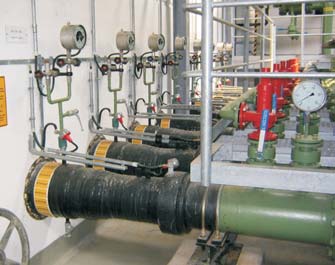NATO Petroleum Committee
The NATO Petroleum Committee (NPC) is the senior advisory body in NATO for logistic support to Alliance forces on all matters concerning petroleum, including the NATO Pipeline System (NPS), other petroleum installations and handling equipment.

The NPC acts on behalf of the North Atlantic Council, in consultation with the NATO Military Authorities (NMAs), NATO Agenices, other senior NATO committees and other military and civil bodies to meet NATO’s petroleum requirements in times of peace, crisis and conflict, including expeditionary operations.
The NPC was originally established as the NATO Pipeline Committee in 1956, but was renamed the NATO Petroleum Committee in March 2008 to better reflect its wider role and responsibilities.
Main tasks and responsibilities
The NPC is responsible for dealing with all matters concerning fuels, oils, lubricants and related products, as well as matters dealing with their receipt, storage, transportation, quality and issue.
Specifically, the NPC will:
- review, assess and evaluate, in conjunction with other NATO authorities, the overall Alliance military petroleum logistics organization, policy, plans, procedures and capabilities with the aim of enhancing the interoperability, performance, efficiency, safety, security and effectiveness of support to NATO missions and operations;
- maintain, in close coordination with NATO member countries, other NATO Committees and organizations, a NATO petroleum crisis management organization and procedures capable of addressing its needs in case of any event that affects the overall supply of petroleum products;
- develop standardization of petroleum products and handling equipment used by all naval, land and air assets in order to improve the operational efficiency, effectiveness and interoperability of NATO and NATO-led forces;
- improve the effectiveness of NATO forces through standardization of the facilities, equipment and procedures for handling fuels and lubricant products in routine and expeditionary operations;
- examine proposals for delivering emerging technologies and make recommendations for the research and development of new equipment in support of NATO’s transformation process;
- liaise closely with civil standards organizations to gain the benefit of their knowledge and experience in supporting the interoperability of forces and equipment in accordance with the NATO Framework for Civil Standards;
- exercise policy control for the operation and maintenance of the NPS and all fuel storage facilities constructed within the NATO Security Investment Programme (NSIP);
- develop and coordinate proposals concerning the joint civil/military use of existing and new NATO infrastructure petroleum facilities in order to lower capital investment and Operations and Maintenance (O&M) expenses during peacetime;
- liaise with relevant specialist bodies outside NATO on matters of mutual interest as appropriate;
- participate in the development of guidelines concerning environmental matters associated with the storage, handling and distribution of petroleum products;
- liaise closely with the Senior NATO Logisticians’ Conference on petroleum logistic matters;
- participate in and contribute to the activities of the NATO Internal Task Force on Energy Security and assist in developing consolidated proposals to Allies;
- direct the work of its subordinate bodies in the specific fields of petroleum products and petroleum handling equipment;
- liaise with the Senior Resource Board, Infrastructure Committee and Senior Civil Emergency planning Committee as appropriate
- develop in close coordination with other relevant Committees guidelines for civil-military cooperation on petroleum matters as required taking due account of civil standards as appropriate;
- participate in the development of guidelines concerning environmental matters associated with the storage, handling and distribution of petroleum products; and
- provide the focal point and forum for the consideration of all NATO-related petroleum matters.
Working mechanisms
The NPC meets twice a year at NATO Headquarters or as otherwise required and submits annual reports to the North Atlantic Council.
Meetings are held in two parts: one in restricted, NATO-only, session and one in open session with Partner, Mediterranean Dialogue, Istanbul Cooperation Initiative and other non-NATO countries as deemed appropriate. The NPC meetings are chaired by the Head, Logistics (International Staff).
The NPC executes its work in conjunction with its three permanent Working Groups:
- Petroleum Policy and Planning Working Group focuses on policy and planning issues and on special tasks, as directed by the NPC. It meets twice a year in NATO-only session prior to the NPC meeting.
- NATO Fuels and Lubricants Working Group develops standardization of fuels, lubricants and associated products used by all naval, land and air assets in order to improve interoperability and the effectiveness of NATO forces. It meets once a year in open session with Partners and, if required, in restricted NATO-only session. Meetings are held in conjunction with the Army, Aviation and Naval Fuels and Lubricants Working Parties.
- Petroleum Handling Equipment Working Group improves the effectiveness and interoperability of NATO forces through the standardization of facilities, equipment and procedures for handling fuel and lubricant products. It meets once a year in open session with Partners and, if required, in restricted NATO-only session
